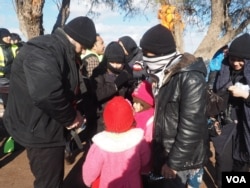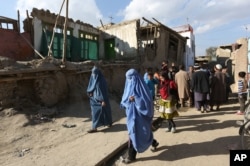The United Nations on Wednesday launched an appeal for $393 million in humanitarian assistance to conflict-torn Afghanistan this year to meet “the acute life-saving” needs of millions of vulnerable people across the country.
Mark Bowden, the U.N. Humanitarian Coordinator, said Wednesday support related to food, health care, nutrition, safe water and sanitation will reach an estimated 3.5 million people under the 2016 Humanitarian Response Plan (HRP) for Afghanistan.
Bowden spoke while launching the appeal together with Afghan Chief Executive Abdullah Abdullah in Kabul.
Bowden said he anticipated an increase in conflict-driven humanitarian needs.
"It is now one of the world’s most long-running, protracted humanitarian crises, in which conflicts remain the main driver of humanitarian needs," he said.
"Last year, violence led to more than 300,000 people fleeing their homes for safety. That’s a 160 percent increase over the year before. This year we estimate that a quarter of a million people will flee their homes due to armed conflict,” Bowden added.
Taliban attacks
There has been no let up in Taliban attacks in Afghanistan over the past year and the insurgency's advances have sparked concerns of increased bloodshed when the traditional spring fighting season begins in April.
Bowden said Afghanistan is currently hosting an estimated 40,000 refugee families from neighboring Pakistan who fled the counterinsurgency army operations in the Pakistani border areas.
Moreover, the powerful earthquake that struck the northeastern province of Badakhshan in October left an estimated 130,000 people in need of humanitarian assistance, in a country prone to natural disasters, he said.
Donor nations
Chief Executive Abdullah said the government is hopeful donor nations will match commitments of previous years to assist and support the needs of the Afghan community.
Addressing Wednesday's event, German Ambassador to Afghanistan Markus Potzel warned, “It is essential that the most vulnerable Afghans receive appropriate life-saving assistance, quickly. If their needs are not met, Afghans will choose to migrate out of their country as a last resort."
Afghanistan is one of the world’s poorest countries, with high levels of poverty, a lack of livelihood and income generating opportunities, chronic health problems, and poor infrastructure contributing to its humanitarian challenges.






